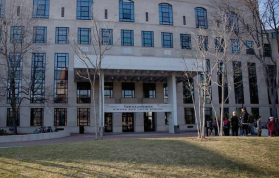
The CRLS School Council hosted its final meeting of the 2025 school year on May 28th, where several concerns regarding AP Exams, Grading for Equity (GFE), math placement, and student policies were discussed. Attending representatives, as well as in-person and virtual attendees contributed to the conversation.
This year at CRLS, statistics show that 1,293 AP Exams have been taken—a 22.5% increase from last year’s 1,055. There was significant growth in participation in AP US History, AP English Literature, and AP Physics C: Electricity and
Magnetism. It was also the first year in which CRLS offered AP Macroeconomics and AP Music Theory. Even with the rise in participation, 29 students ran into technical difficulties, payment issues, or showed up late for the exam.
Conversations immediately erupted in recommendations for the next AP season. Currently, CRLS uses My School Bucks for payment, a process that has proved to be tedious. Students must join AP Classroom on the College Board website, register for the exam, make a My School Bucks account, and then pay for the exam. Interim Principal Allan Gately Gehant was prompted to utilize the Total Registration system, which, unlike My School Bucks, isn’t a participating provider for the College Board. Other schools in Massachusetts use Total Registration in hopes of making the registration process for AP Exams smoother and more efficient for families.
Another significant point of the discussion revolved around Grading For Equity(GFE) initiatives. This approach, implemented into CRLS during the 2023–2024 school year, included setting the grade floor to 50%, eliminating extra credit, and providing opportunities for revision. The most controversial topic among members was participation grades, which were eliminated by GFE. Some felt that grading participation was unnecessary, arguing that being present and engaged in class is a basic expectation—not something that should earn extra credit or rewards. However, Ms. Rayman-Read, a CRLS Critical Issues and AP Psychology teacher, strongly disagreed with this viewpoint and told the Register Forum, “These are adolescents for whom rewards are very important. For whom the concept of ‘what they’re supposed to do’ is not developed mentally. It’s really important to give them reasons to show up for class.”
Finally, the council invited subcommittee members Anurag Bhargava ’27 and Sam Mayle ’27 to address issues concerning upcoming high schoolers and math placement requirements. Students who excel at math still need extensive caregiver advocacy to place beyond Algebra 2, which leads to inequitable access to math classes where some
students are pressured by parents to place into advanced math beyond their comfort level while others are stuck in classes that are below their ability. The two sophomores proposed better communication between the math department and families and diagnostic exams for ninth grade math placements that will pinpoint areas of weakness for each student to personally work on.
Finally, some floater-conversations throughout the meeting discussed phone policies. The committee brainstormed more efficient ways to store phones. One idea was using magnetic phone pouches: the pouch is locked with a special magnet and then can be unlocked using a special device. They hoped that with this mechanism, the students wouldn’t be concerned about the whereabouts of their phone since it’s still in their pocket—just unable to be used.
This article also appears in our June 2025 print edition.













